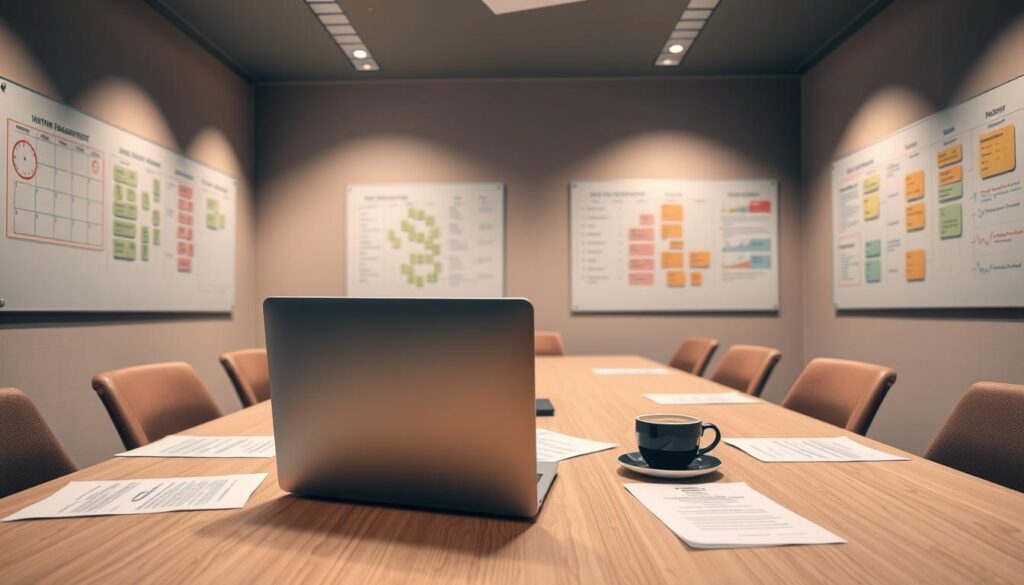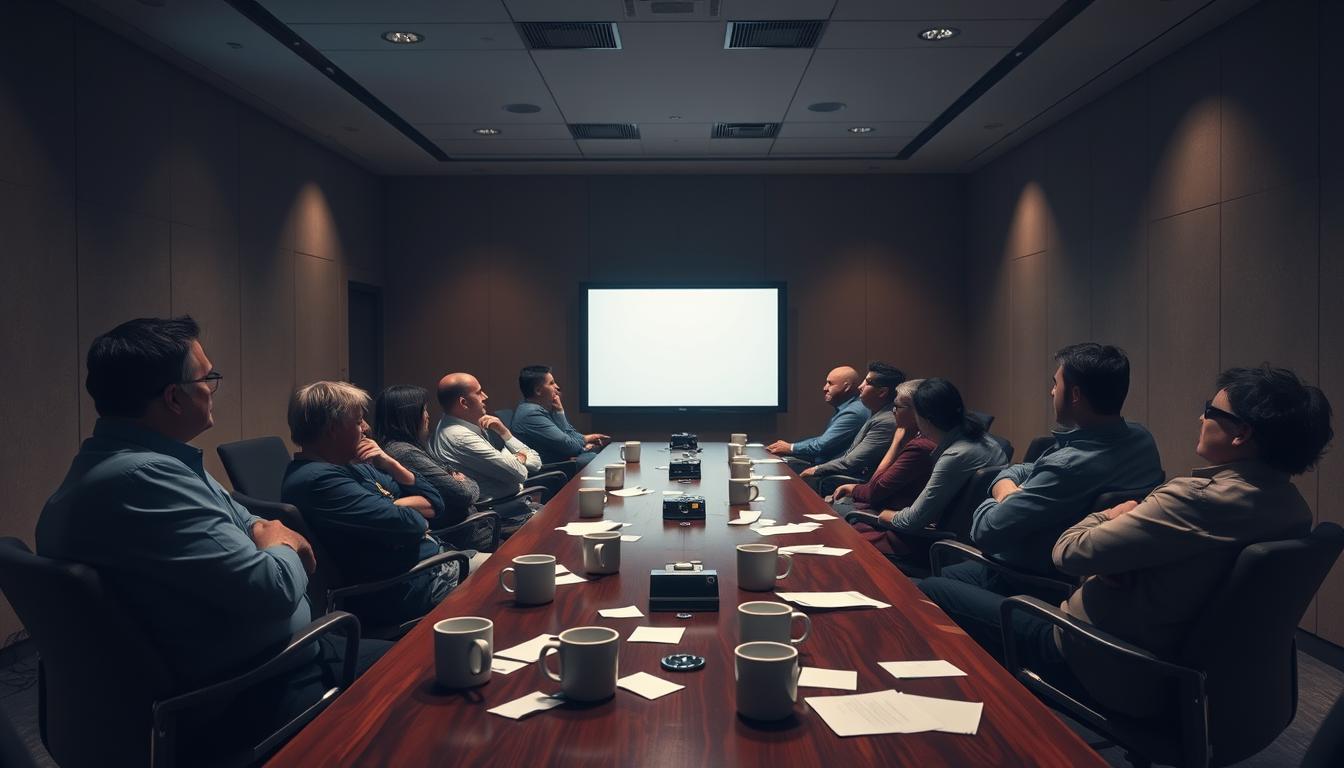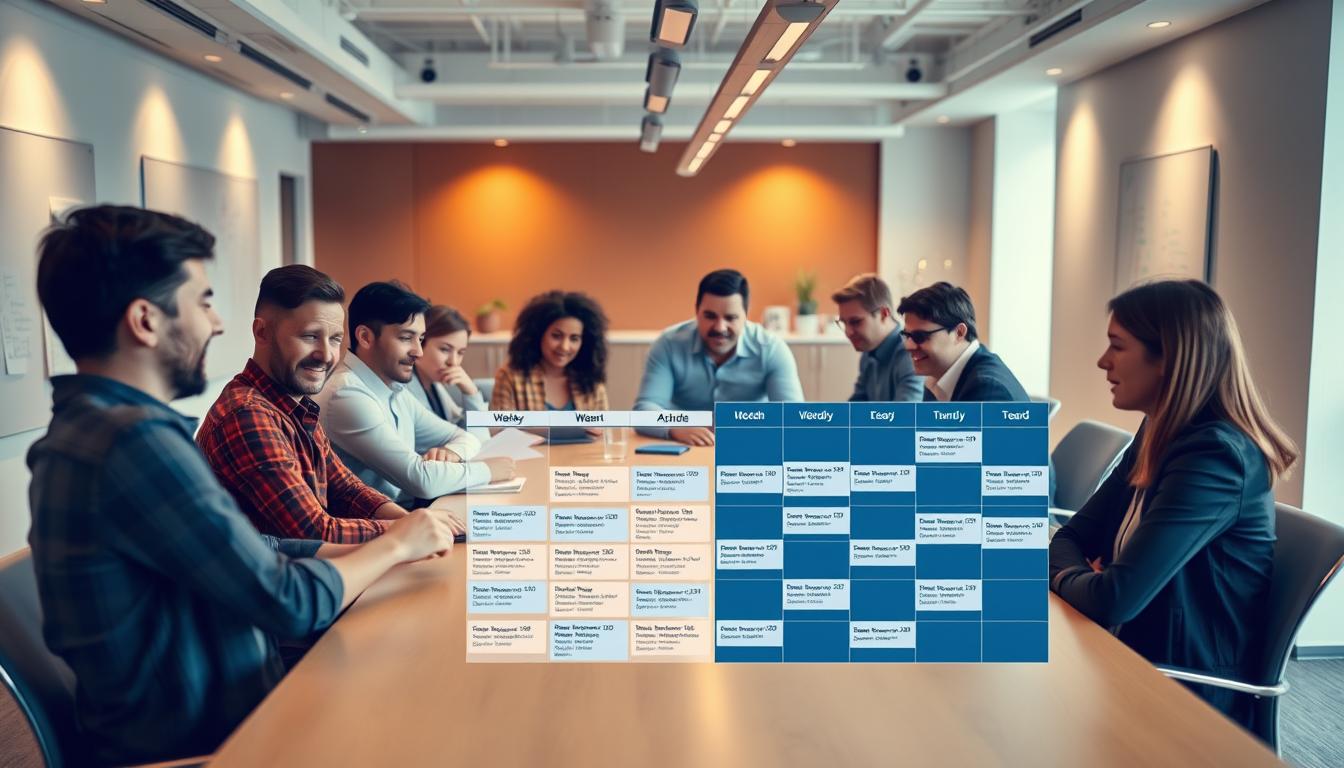In our quick-moving work world, companies see how key efficiency is in small team meetings. About 21% of work hours go to meetings, many of which don’t help much. This shows we need better ways to make meetings useful and encourage teamwork.
Making meetings better can turn them from boring to exciting. They become chances for teams to work together, share ideas, and solve problems.
The Importance of Efficient Meetings
Efficient meetings are key to boosting team work and getting more done. They’re not just for making decisions. They also help team members bond. But too often, meetings go off track. This leads to lost time and little progress. Focusing on meeting structure and goals can lead to better engagement and clear outcomes.
Understanding Team Dynamics
A successful meeting needs a deep understanding of how a team works together. Teams do best when everyone talks openly, trusts each other, and respects each other. Meetings where everyone feels important and listened to help everyone work together better. By holding these meetings regularly and with a clear purpose, we can hit our team’s targets.
Impact of Meetings on Productivity
Meetings have a huge effect on how much work gets done. But bad meetings can make us feel drained and distract us. This means we get less done. Research shows a lot of meeting time isn’t useful. To fix this, leaders must focus on clear goals and steps to follow. This way, meetings become a useful tool for achieving great results.
Identifying the Purpose of Meetings
Knowing why meetings are held is key to planning them well. It’s important to set clear goals for each meeting. These goals might include coming up with new ideas, getting everyone on the same page, making choices, or starting projects.
A solid plan guides the meeting. This plan stresses what the meeting is for and helps keep talks on track.
Defining Meeting Objectives
For meetings to lead to success, teams need clear objectives. These goals should connect directly to what the team wants to achieve. Whether it’s planning a project or resolving issues, clear aims help keep everyone focused.
Assessing Meeting Necessity
It’s crucial to think about if a meeting is really needed. Sometimes, what you need to discuss can be done by email or online tools. This way of thinking helps cut down on unneeded meetings.
This approach makes sure time is used effectively, making teams more productive.
Effective Preparation for Meetings
Getting ready for meetings the right way helps them go smoothly and be useful. Focusing on making an agenda and getting the pre-read materials ready can change meetings into times of great teamwork.
Creating and Sharing Agendas
Creating a clear agenda is important for a good meeting. An agenda needs to:
- Outline specific topics to be discussed
- Assign discussion leaders for each topic
- Establish time limits for each part of the meeting
Sharing the agenda before the meeting helps everyone get ready. This way, people can come prepared, keeping the discussion on track and important.
Sending Pre-reads for Context
Knowing why pre-reads matter makes meetings work better. Sending stuff to look over before the meeting lets everyone get familiar with the topics. This helps everyone have deeper talks and cuts down on time spent going over old news.
Efficiency in Small Team Meetings
To get the most out of small team meetings, it’s important to include the right people. Everyone who comes should add something important to the conversation. This way, the meeting stays on track. Also, when you choose people because they know a lot about the topic, everyone is more focused. Making sure everyone knows what’s expected before the meeting helps too. This makes discussions better and helps meet the goals of the meeting.
Engaging the Right People
Having the right folks in the meeting makes it way more effective. Here are some tips on who to invite:
- Bring in decision-makers and experts for useful advice.
- Keep the group small, inviting only those who really need to be there. This cuts down on distractions.
- Make sure everyone, even the quiet ones, gets to share their ideas.
Setting Clear Expectations
Letting everyone know their roles and goals ahead of time is key for a good meeting. You should:
- Share an agenda that includes what will be talked about and who will speak.
- Make the meeting’s goals clear to keep the focus.
- Ask people to review related materials before the meeting.
Creating an Engaging Meeting Environment
An engaging meeting space makes teamwork better. It’s key to have a positive talk vibe for open and creative ideas. A few easy tips can make meetings fun and rewarding.
Setting the Tone for Discussion
Icebreakers are a great way to make people comfy as the meeting starts. Playing light music can also welcome folks as they come in. This makes a friendly space, encouraging everyone to share ideas freely.
A warm welcome and clear goals help keep discussions on track. They prepare everyone for working together effectively.
Using Interactive Tools Effectively
In our digital world, using interactive tools helps make meetings lively. Features like virtual whiteboards or Miro let team members see and add ideas on the fly. These tools make sure everyone gets to join the talk.
Maximizing Meeting Productivity
To make meetings more productive, we need a planned approach. Managing time well in meetings can really help. It keeps the discussion on point and makes sure every item on the agenda gets enough time. This way, everyone stays involved and on task.
Implementing Time Management Techniques
Managing time is key to keeping the meeting agenda on track. Try using:
- Strict time limits for each agenda item
- Timekeeping tools or apps
- Regular checks on the schedule’s progress
These strategies help keep the meeting within its set time and stop off-topic chats.
Assigning Meeting Roles
Having clear roles in meetings makes communication smoother and processes more efficient. The roles include:
- Facilitator: Guides the discussion
- Timekeeper: Keeps an eye on time
- Note-taker: Writes down important points
Each role is key to keeping the focus on meeting goals. Setting roles early leads to better teamwork and success.

Post-Meeting Action Items and Follow-ups
After meetings, documenting key points and assigning tasks is crucial. This helps everyone know what they’re supposed to do and by when. Regular follow-ups after the meeting make sure that plans turn into actions.
Capturing Key Takeaways
Writing down what happened in meetings is key for making choices. Keeping track of main points helps everyone stay on the same page. This includes:
- Important decisions made during the meeting
- Insights or suggestions that emerged
- Potential challenges identified
Assigning Action Items with Deadlines
Giving tasks with deadlines helps keep everyone accountable. Clear tasks make it easy to see who needs to do what and by when. To do this well, keep in mind:
- Identify who is responsible for each action item.
- Set realistic deadlines to ensure timely completion.
- Utilize project management tools for tracking progress.
Soliciting Feedback for Continuous Improvement
Asking for feedback after meetings is key to making them better and growing a team’s culture. When everyone has a chance to speak up, it helps build a community that values communication. This leads to better teamwork and progress.
Encouraging Open Communication
Making a space where people can openly talk about meetings is crucial. It’s important to let them share their ideas on the timing, setup, and what’s discussed. This kind of open talk can lead to new ways to make meetings more useful.
Assessing Meeting Effectiveness
Evaluating how meetings run regularly helps spot what needs to change. This can be done through simple surveys or casual talks. Looking into this feedback helps the team improve and make meetings more fitting for working together.
Conclusion
Improving how small teams meet is key for better team work and getting more done. Using the tips shared in this article can change how teams meet for the better. It’s important to know what you want to achieve, get the right people involved, and make sure discussions lead to action.
This commitment to better meetings can change how the team works together. Meetings will become more about achieving goals than just something you have to do. This boosts team spirit and sparks new ideas.
To wrap up, making meetings better offers lasting rewards. Teams that constantly look for ways to improve will stand out. They’ll be more successful in the fast-moving world of business.



